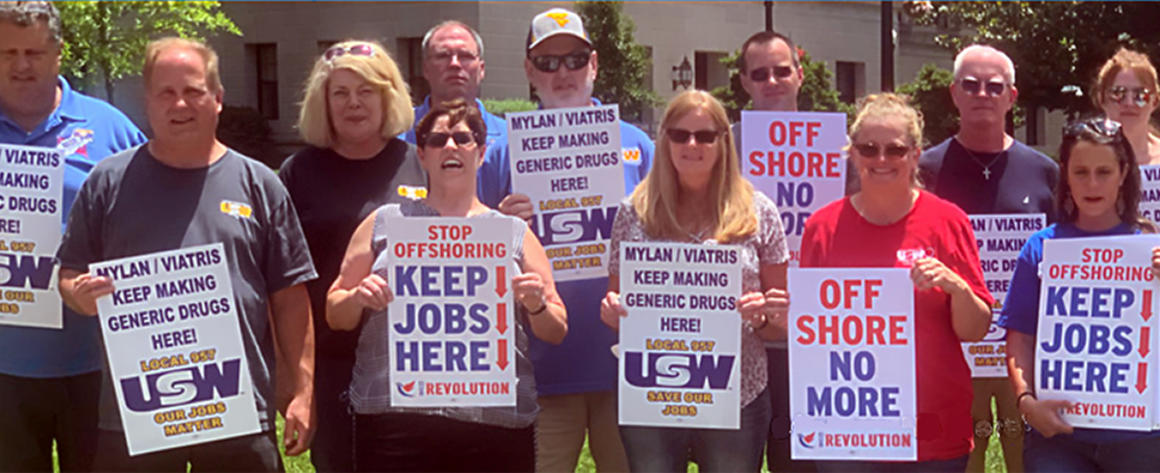The Laura Flanders Show on July 25, 2021 aired an in-depth report on the closing of the Viatris (formerly Mylan) pharmaceutical plant in Morgantown, West Virginia, followed by a live panel discussion.
The Democracy Collaborative has joined United Steelworkers Union Local 8-957, Our Revolution, Social Security Works, and other organizations in an effort to stop the decommissioning of the United States’ largest generic pharmaceutical manufacturing plant.
As this Associated Press story explains, we called on President Biden’s administration to invoke the Defense Production Act to immediately stop the pharmaceutical corporation Viatris from dismantling its Morgantown, West Virginia plant and laying off close to 1,500 employees. Viatris had announced that it would close the plant—which has the capacity to produce more than 18 million doses of life-saving generic drugs—on July 31, 2021, and move the plant’s production to India. Closing that plant would leave the United States with virtually no domestic production of generic pharmaceuticals, breaking a critical link in America’s pharmaceutical supply chain.
[Read the letter asking the Biden administration to save the Viatris Morgantown plant.]
If the name Viatris is unfamiliar, it’s because it was just created in 2020 through a merger of Mylan Pharmaceuticals and a Pfizer subsidiary, Upjohn. Mylan had operated the plant in Morgantown since 1965. announced in December that it planned to permanently shut down operations at the flagship Mylan Pharmaceuticals Plant in Morgantown, West Virginia.
The letter to the Biden administration notes that because of Medicare, Medicaid, the Veteran Health Administration, and through Affordable Health Care Act provisions, billions of taxpayer dollars flow through both the West Virginia plant and Viatris’ global operations. Currently, those dollars help support wages for highly skilled workers, many of them unionized, who earn as much as twice the median household income in Monongalia County.
The economic impact on Morgantown and the country will be catastrophic. According to a study done for The Democracy Collaborative by Michael H. Shuman, the cumulative job loss as a result of the plant closure over the following year would total more than 4,600 jobs—6% of the county’s employment. In addition, the country would lose about $1 billion in economic activity and nearly $63 million in lost state and local tax revenue.
[Read our economic analysis of the Viatris plant closing.]
As the letter to the Biden administration notes, “In the absence of a national industrial strategy for US pharmaceutical manufacturing, we have every reason to expect privately held corporations like Viatris to continue outsourcing American jobs and dismantling our manufacturing capacity. Only long-term strategies, like taking the pharmaceutical sector into public ownership, can successfully block key industries and jobs from being outsourced by corporate interests. Congressional leaders from both parties have proposed a review process for addressing overreliance on foreign countries in our pharmaceutical supply chain.”
In the meantime, the letter calls on the Biden administration to use its existing executive authority under the Defense Production Act to keep the plant from being decommissioned. At that point, the administration can convene a task force with labor organizations, public health representatives, economic development representatives, local community representatives, and national security representatives to determine the most strategic use of the plant for the manufacture, packaging, and shipping of critical, life-saving medications or pharmaceutical inputs. Once a new strategy is in place that aligns the plant’s physical assets with our national interests, the plant can be retrofitted as needed and current workers can be rehired.
[RELATED: A public option for pharmaceuticals: Read our “Medicine for All” report.]




